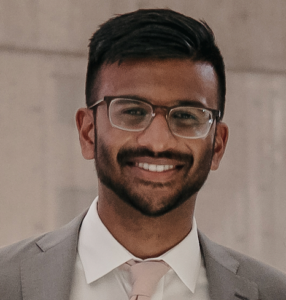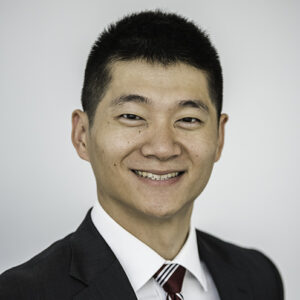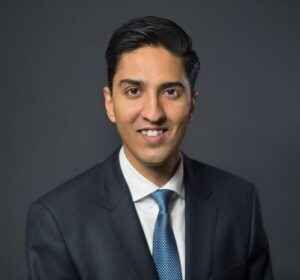The Associate Retinal Consultants, P.C. (ARC) staff believes that the best way to stay on top of the latest technology and advances in the field of ophthalmology is to know it well enough to teach it.
The mission of the ARC Vitreoretinal Fellowship program is to provide a graduate experience with increasing responsibility and clinical decision making and other aspects of patient care, including surgical and non surgical diagnostic and therapeutic modalities.
Current Fellows
Current Fellows
 Viren Govindaraju, M.D.
Viren Govindaraju, M.D.
Medical School: Central Michigan University College of Medicine
Ophthalmology Residency: Oakland University William Beaumont School of Medicine
 Tianyu Liu, M.D.
Tianyu Liu, M.D.
Medical School: University of Pennsylvania-Perelman School of Medicine
Ophthalmology Residency: Scheie Eye Institute
 Omar Moinuddin, M.D.
Omar Moinuddin, M.D.
Medical School: Oakland University William Beaumont School of Medicine
Ophthalmology Residency: University of Michigan W.K. Kellogg Eye Center
 Viet Chau, M.D.
Viet Chau, M.D.
Medical School: University of Texas Southwestern Medical Center
Ophthalmology Residency: Bascom Palmer Eye Institute – University of Miami
 Lydia Sauer, M.D., Dr. Med.
Lydia Sauer, M.D., Dr. Med.
Medical School: Friedrich-Schiller University – School of Medicine
Ophthalmology Residency: John A. Moran Eye Center – University of Utah
Vitreo-Retinal Fellowship Guidelines
Fellowship Guidelines
Approved by the American Society of Retina Specialists (ASRS), Retina Society, Macula Society, and Association of University Professors of Ophthalmology (AUPO).
I. Introduction
The purpose of this document is to provide guidelines for applicants for fellowship training in vitreo-retinal diseases and surgery.
II. Program Directors
A. Program Directors should be certified by the American Board of Ophthalmology or, in Canada, by the Royal College of Physicians and Surgeons, and specialize in the diagnosis and management of vitreo-retinal diseases. While a program with one instructor may be acceptable, a program with two or more instructors is preferred so that the fellow will be exposed to different techniques and philosophies.
B. There should be close supervision and adequate contact with the instructors. This is important:
1. To receive direct feedback on the clinical evaluation of patients in order to enhance and clarify findings on the examination, and to assist in formulation of the proper diagnosis and management.
2. To observe and assist vitreo-retinal surgeons in surgery. Careful supervision in the operating room is essential. Unsupervised surgery may promote independence, but this is not the primary purpose of fellowship training.
C. It is desirable that the fellowship be affiliated with an accredited ophthalmology residence program. The continued exposure to the other subspecialty areas, grand rounds, teaching conferences, and the academic atmosphere of a residency training program can greatly enhance the fellowship experience.
III. Duration of Fellowship Training
The fellowship should be at least one year in duration. This minimum of twelve months should be spent in clinical training, and should not include a block of time set aside for research or laboratory work. If time is to be allocated for research activity, the fellowship duration should be between 18 and 24 months.
IV. Medical Retinal Diseases
A. Content
The fellow should be exposed to as broad a variety of retinal and vitreous conditions as possible. This experience should include ocular oncology and uveitis as well as macular disease, retinal vascular disease, retino-choroidal degeneration and hereditary diseases, and infectious retinal disease.
B. Fluorescein Angiography
The principles of fluorescein angiography, including supervised independent interpretation of a large number (at least 250) of fluorescein angiograms are basic to the care of patients with retinal and choroidal disease. The ability to perform fluorescein angiography is optional, but understanding of the process and the management of allergic reactions is essential.
C. Electrophysiology
The understanding of indications for electrography and electro-oculography is basic. The interpretation of the recordings is important in the management of a variety of retinal degenerative diseases.
D. Ultrasound
The fellow should be familiar with the basic principles of A scan and B scan and should be able to perform B scan ultrasound examinations.
E. X-ray, CT-Scan, MRI
The interpretation of orbital x-rays, CT or MRI scans, especially for penetrating injury, and particularly to evaluate eyes with suspected intraocular foreign body, is basic.
F. Special rotations to enhance the basic knowledge of fundus and fluorescein photography, electrophysiologic tests and ultrasound are a desirable part of the retina-vitreous fellowship curriculum.
V. Training of Vitreo-retinal Surgery
All vitreo-retinal fellowships should include training in both vitreous and retinal surgery:
A. Rhegmatogenous Retinal Detachment.
All fellows should understand the features which differentiate rhegmatogenous and secondary retinal detachment. All fellows should perform personally and/or assist in surgical repair of rhegmatogenous retinal detachment to the point of being expert with localization of retinal tears, treatment of retinal tears, and the placement of scleral buckles. A minimum of 75 such cases is recommended.
B. Posterior Vitrectomy
All fellows should assist in or personally perform posterior vitrectomy for a variety of indications, including complicated retinal detachment with proliferative vitreo-retinopathy, proliferative diabetic retinopathy, giant retinal tear, vitreous hemorrhage, retinal detachment, endophthalmitis, intraocular foreign bodies, and others. Participation in 100 or more such cases during fellowship training is recommended.
C. Ocular Trauma and Intraocular Foreign Bodies
Fellowship training must include evaluation of eyes with both blunt and penetrating injury. The techniques for pre-operative evaluation, including specialized studies to search for a retained intraocular foreign body, are to be included. All fellows should assist in or personally perform repair of ruptured globes and removal of intraocular foreign bodies. The use of the giant magnet as well as the rare earth magnet and the use of vitreous forceps should be included.
D. Laser Photocoagulation
1. Diabetic Retinopathy
Knowledge of the indications and treatment of macular edema and proliferative diabetic retinopathy are essential. Each fellow should personally perform both panretinal photocoagulation and treatment for diabetic macular edema. Participation in the management of at least 50 cases is recommended.
2. Other Retinal Vascular Diseases
Panretinal photocoagulation or sectoral retinal photo-coagulation for vaso-proliferative disease due to non-diabetic causes, such as branch vein occlusion or central vein occlusion, is important.
3. Choroidal Neovascular Membranes
An understanding of the pathogenesis of choroidal neovascular membranes due to age-related macular degeneration, the ocular histoplasmosis syndrome, myopia, angioid streaks, or idiopathic conditions, is basic. The interpretation of fluorescein angiography and understanding of the indications for and anticipated results of laser photocoagulation are essential. The treatment of parafoveal choroidal neovascularization during fellowship training is recommended.
VI. The above criteria apply to fellowships in vitreo-retinal diseases and surgery. Certain fellowships may be designed for medical vitreo-retinal disease, and other disease, and others may be designed for surgical vitreo-retinal disease. However, such fellowship training should be very clearly defined and the diploma of completion should state the nature of the fellowship. The successful completion of a medical fellowship in vitreo-retinal disease does not imply a basic understanding of vitreo-retinal surgery. Similarly, a surgical fellowship in vitreo-retinal diseases does not necessarily imply a basic understanding of medical fellowship-retinal disease. Preferably, a vitreo-retinal fellowship should include both medical vitreo-retinal training and surgical vitreo-retinal training as outlined. It is the responsibility of the Fellowship Director to certify that the curriculum is adequate, preferably with these guidelines as minimum standards, and that the fellow has satisfactorily completed the fellowship.
Vitreo-Retinal Fellowship Application
Vitreoretinal Fellowship Application
If you are not a U.S. citizen, you must have an H1B Visa in order to apply for this fellowship.
Applications will be processed through SF Match and are available on their website: SF Match
Application deadline: August 21, 2024
In addition to the documents required with the SF Match application, the following supporting documents are required for our Vitreoretinal Fellowship Application:
- Written verification of any postgraduate clinical training obtained in U.S. hospitals (this can be a Letter of Good Standing from your Program Director or a Certificate of Completion).
- A clear, readable photocopy of your USMLE scores.
- Curriculum Vitae.
- Passport-sized photo.
- A clear, readable photocopy of your medical school transcript.
Date of Fellowship Interview: Saturday, October 5, 2024
* Faculty interviews at ARC, Saturday, October 5, 2024
Located in the Lower Level of the Neuroscience Building, 3555 W. 13 Mile Road, LL-20, Royal Oak, MI 48073
Send supporting documents to: [email protected]
Tina Cece Bettsteller, Fellowship Administrator, 248-319-0161 x 1006
Associated Retinal Consultants – 2000 North Huron River Dr., Suite 100, Ypsilanti, MI, 48197
Vitreo-Retinal Fellowship Research Opportunities
Fellowship Research Opportunities
Research time is allocated during both years of the fellowship, depending on the specific interests and clinical load. Ample clinical material is available for projects under the direction of the Associated Retinal Consultants Physicians. Each fellow is also strongly encouraged to participate in a project in the vitreoretinal research laboratory, either on the Royal Oak campus of William Beaumont Hospital in the Beaumont Research Institute or at the Eye Research Institute of Oakland University.
Visiting Domestic & International Scholars
Visiting Domestic & International Scholars
Domestic and international physicians are welcome to arrange a one week, one month, three month or one year experience as a Visiting Scholar. This opportunity is made available for senior clinicians who wish to have an abbreviated experience, as well as for clinicians in other specialties (pediatric ophthalmology, neonatology) with an interest in pediatric retina. The Visiting Scholar experience is not funded by ARC.
Please call: 248-288-2280 or e-mail: [email protected] for assistance in arranging the timing of your visit, as well as for information regarding lodging accommodations in the vicinity of the hospital.

